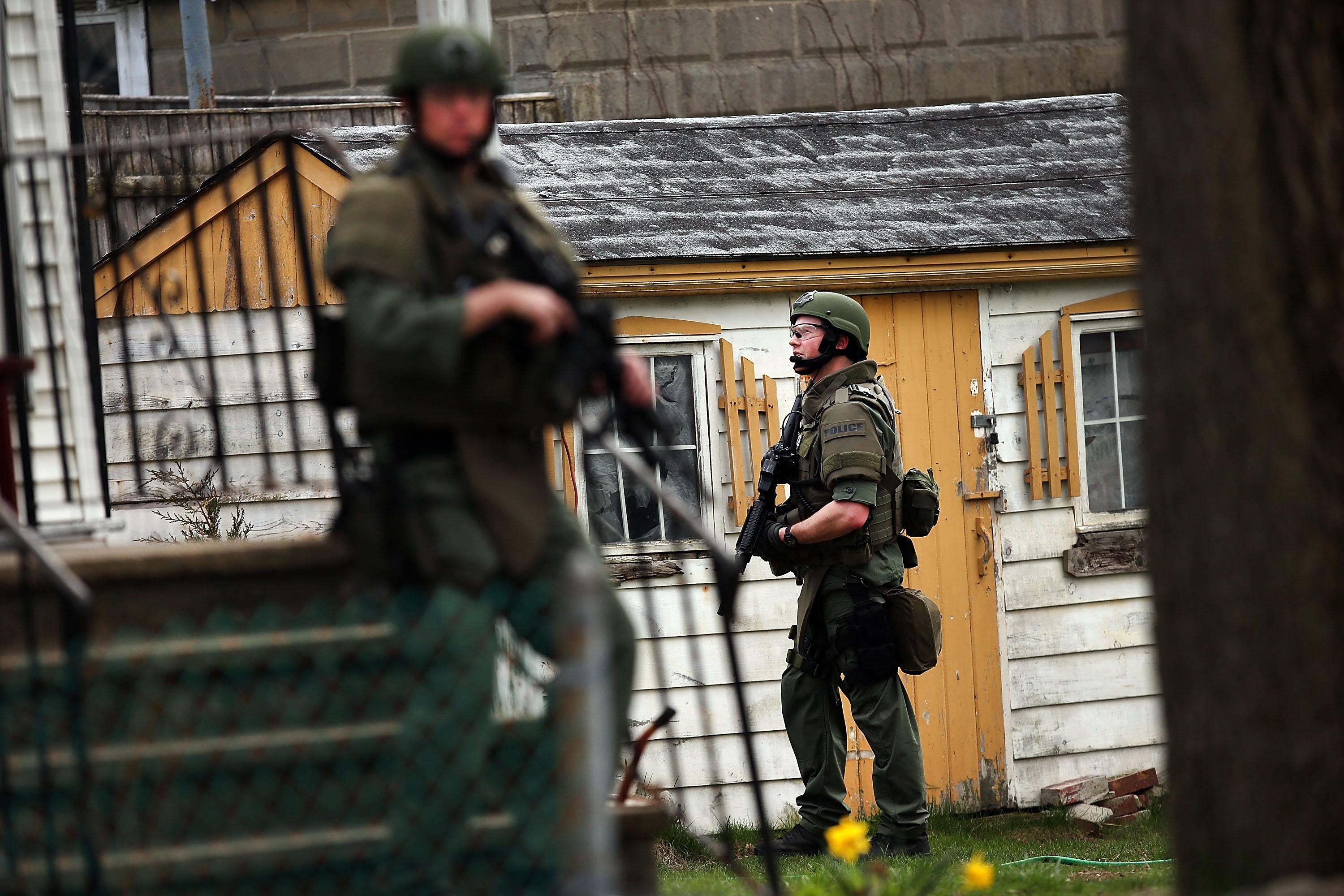Answer by Justin Freeman, retired cop:
This question originally appeared on Quora.
This one’s a tangled mess of legal and practical issues. If you want simplistic speculation or out of context sound bites, there are thousands of Twitter accounts ready to fill this void in your life; otherwise, bear with me.
- The units going door-to-door weren’t the type you say no to. They didn’t have neighborhood cops tap-tap-tapping on screen doors: Search teams were composed largely of SWAT units in full tactical gear.
- There were myriad unspoken pressures to consent to sweeps. Communication from SWAT squads would have been resolute, to say the least. There weren’t any episodes of, “Hey, uh, would you care if we came in your house and looked around?” Besides that, it’s very unlikely anybody in that area wanted to be an impediment to progress in the search. If something goes bad later, and your neighbors find out you had been haranguing federal agents on your front stoop, to quote a certain ski instructor, you’re gonna have a bad time.
- Objections would be swiftly met with assurances of scope. I ran into this on occasion. When I was a rookie, a situation arose in which we needed to clear a residence for some reason, and the shifty dude at the front door started balking at letting us come in. It was gray as far as emergency warrant exceptions went, so my street-wise backup officer said something along the lines of, “Listen, pal, all we want to do is make sure this guy’s not in there. We don’t have time to f— around with your misdemeanor weed and paraphernalia tonight, so if you don’t have our guy or a dead body in there, we’re pretty much gonna bid you a nice evening and be on our way.” The guy considered for a beat, then cleared the way. We swept the residence, hat-tipped him on our way out, and went on to the next door. I’m positive objections would have been met with something similar, though perhaps with less patience.
Now, I don’t know what the legal framework was behind the door-to-door canvass, or how exactly outright refusals would have been (or were) processed. I’m sure they had legal counsel close at hand throughout the duration of the event. That said, here are some considerations:
- Remember, residences were entered to sweep, not to search. There is a significant legal difference. As an officer, if I had suspicion that someone was hiding in a residence that I had gained lawful entry into, I could conduct a sweep to ensure I wouldn’t be ambushed by a hidden subject. However, the scope of this sweep was limited to looking for a person, and limited to areas in which a person could reasonably be expected to hide. Thus, I could look in closets and under beds, but not in nightstand drawers or medicine cabinets. What canvassing units were doing during the lockdown was a sweep, not a search; how this distinction relates to Fourth Amendment issues is a bridge too far as far as my expertise goes. I’ll defer to more competent legal minds there. However, I will note that, despite varying legal opinions here, it’s likely ensuring a terrorist wasn’t passed over and allowed to get behind perimeter lines would be considered “reasonable” by many interpreters of law (definitely not all, though, hence the controversy). This would be less a matter of “throwing the law aside” and more one of operating based on exceptions which have withstood judicial and other scrutinies over time.
- If warrants were deemed required, they could be had quickly. I was first on scene to a grisly three-car accident instigated by a drunk driver. Our point DWI officer attempted to get a breath sample from him on scene, but he had prior DWI convictions and refused. The DWI officer said, “That’s fine, pal. I’ll have a needle in your arm within the hour.” Officer calls a prosecutor at home, who prints a boilerplate blood warrant in his home office while the officer whisks himself to the prosecutor’s house. While he’s coming, prosecutor calls the on-call circuit judge and asks if they can get a warrant signed for an emergency DWI blood draw. Having gotten a green light, officer picks prosecutor up and heads to the judge’s house with completed form warrant in hand. Judge signs the warrant on his front porch, and officer is off to the hospital. With the warrant, hospital staff has legal clearance to draw blood specifically for the criminal investigation, and they do so. Time from breath-test refusal on the accident scene to venipuncture at the hospital? All of 42 minutes. If the FBI’s legal counsel deemed it necessary to secure a warrant in the wake of entry refusals, they could have them in a fraction of this time.
I’ve looked for indications in many different quarters online as to whether anyone in the affected area actually refused a search; I can’t find any. Some general conspiracy theories, some commentary on civil liberties erosion, but no mentions I can find of attempts to decline entry. Thus, any conjecture here or elsewhere may remain purely theory, as I doubt you’d get an answer from the command detail that wasn’t mealy-mouthed and spun to the point of dizziness.
More questions on law enforcement and the police:
